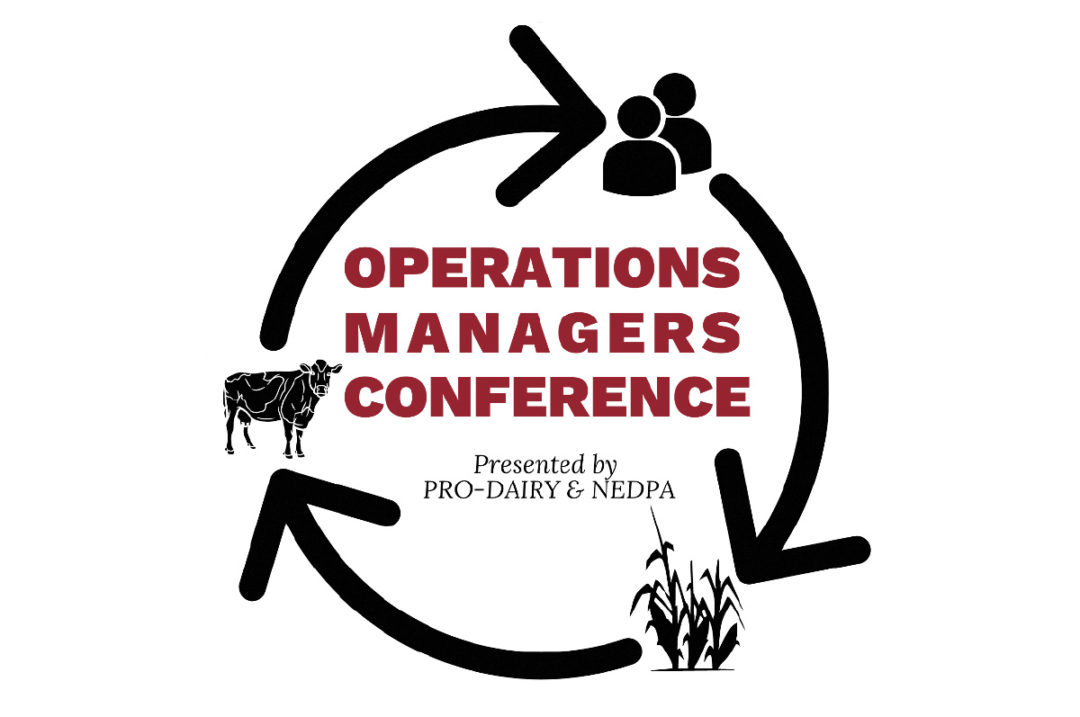Presented by Cornell CALS PRO-DAIRY and the Northeast Dairy Producers Association (NEDPA), the biennial Operations Managers Conference 2023 drew an engaged crowd of middle managers and industry leaders, of which over 45 percent were dairy farm owners, managers and employees. This Manager issue captures the conference theme of managing for consistency while leading through change and several of the conference’s speakers serve as authors.
Keynotes included presentations on “The intersection between animal and human wellbeing and productivity”, “Earning public trust in modern dairy practices”, “Everything you must know about sleep but are too tired to ask!”, and a safety panel.
THE INTERSECTION BETWEEN ANIMAL AND HUMAN WELLBEING AND PRODUCTIVITY
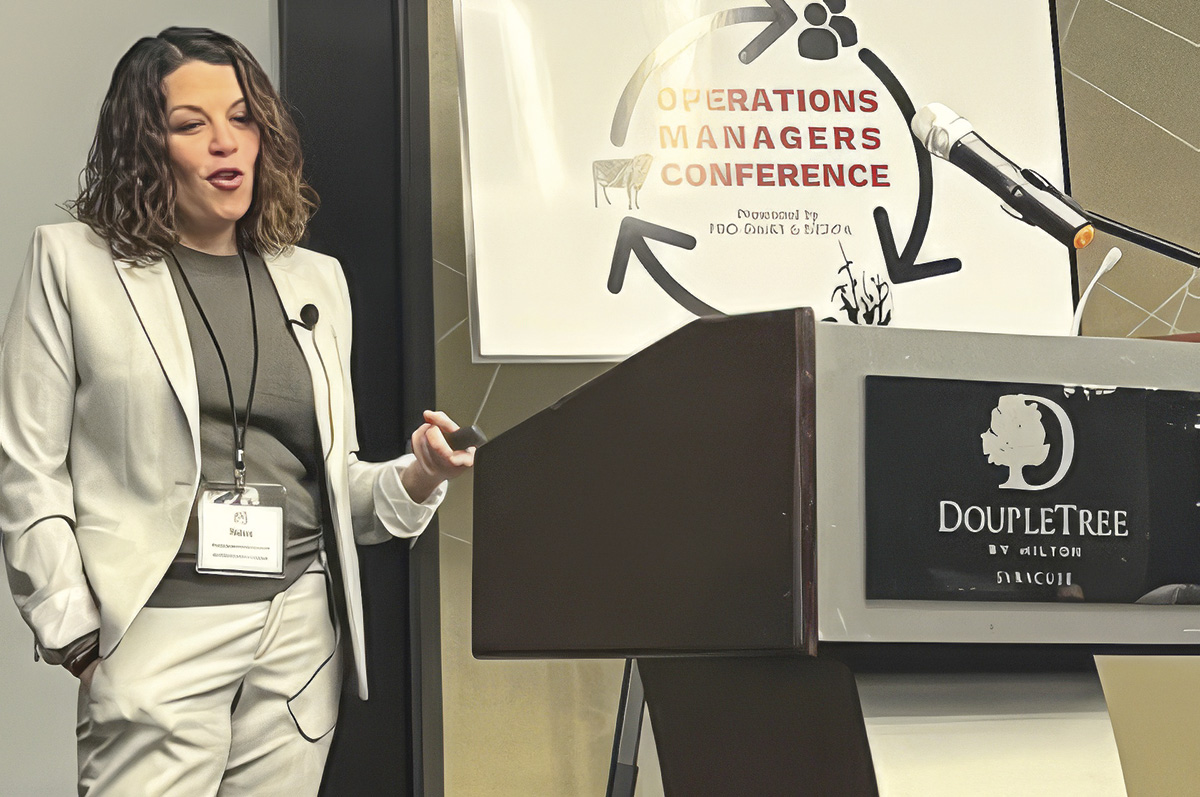 Dr. Noa Román-Muñiz, Colorado State University, kicked off Operations
Managers Conference with a keynote on the intersection between animal
and human wellbeing and productivity. Photo courtesy of Julie Berry.
Dr. Noa Román-Muñiz, Colorado State University, kicked off Operations
Managers Conference with a keynote on the intersection between animal
and human wellbeing and productivity. Photo courtesy of Julie Berry.
Dr. Noa Román-Muñiz, Colorado State University, who spoke several times during the conference, kicked off the lead presentation “The intersection between animal and human wellbeing and productivity” with high energy. “I’m passionate about this,” said the veterinarian, who is from a dairy farm in Puerto Rico. Dr. Román-Muñiz spoke of the numerous challenges associated with human resource management on livestock operations. The multicultural workforce responsible for caring for livestock is burdened with risky working conditions and lacks access to culturally responsive educational opportunities to stay healthy and to understand the why behind their daily job tasks. Foreign-born Latinx workers are at greater risk of injuries and illnesses, and without healthy workers, the health and productivity of livestock also suffers. With a One Health type of approach, Dr. Román-Muñiz and her colleagues have focused their research and outreach efforts on the intersection between animal and human wellbeing and productivity on livestock operations.
Culturally responsive training helps employees feel safe, valued, and prepared to do their job successfully. And the work environment modeled and created by managers impacts the well-being and performance of their employees. Dr. Román-Muñiz shared data that highlights the effectiveness of culturally responsive training in the space of zoonotic disease prevention. Employees are more likely to engage in healthy and preventive behaviors after receiving training, and it is important to provide follow-up training opportunities to emphasize key points and promote a culture of safety and continuous improvement.
“Management shapes the culture of the workplace,” she said. “Managers are key.” Dr. Román-Muñiz especially advocated around training employees on safe euthanasia and empowering workers to know when to make this choice, recognizing the mental health impacts associated with this. Her work with dairy caretakers has shown that making the decision to euthanize an animal is the most difficult part of the process, and that employees appreciate discussing specific cases with their peers and supervisors as a way to decrease doubts and stress. “Caretakers have a strong bond with cattle and a desire to provide high quality care,” she said. “Euthanasia is viewed as a necessary kindness for sick or injured cattle.” Helping employees manage this stress also supports their personal and family life.
In her afternoon presentation “Improving communication among English- and Spanish-speaking team members,” Dr. Román-Muñiz said, “I thought everything had to do with language and culture, but it’s not that simple. It’s how we manage the farm.” Communication gaps can be overcome, but management failures are more challenging. Be conscious about choosing translators and interpreters and, if possible, use more than one. “The person with translation skills has power,” Dr. Román-Muñiz said. Dr. Román-Muñiz spoke about the importance of timely and constructive feedback as a way to show employees that their work matters and that we see their contributions to the operation. She also acknowledged basic knowledge gaps in the workforce. Focus on the how and why and engage workers in the planning of the training so they feel like they’re part of the process. “Explaining the why frees you,” she said. “The focus is on growing everyone. It engages them, and allows them to make decisions, which frees you.”
EARNING PUBLIC TRUST IN MODERN DAIRY PRACTICES
Farmers have a high degree of trust from customers, but many customers are unfamiliar with today’s practices and technologies. “Consumers are truly curious and that curiosity is the reason for their questions. Perhaps they don’t have roots in farming. They’re seeing a change in agriculture and they don’t know if they can trust it,” said Amy te Plate-Church, The Center for Food Integrity, in her keynote presentation “Earning public trust in modern dairy practices.” In research by The Center for Food Inegrity, 65 percent of consumers say they want to learn more about farming and food production. Driving factors include heightened concerns about animal care and food safety, ingredients consumers don’t understand, interest in the relationship between diet and health, and belief that “big food” and “big ag” will put profit ahead of public interest. Maintaining social license to operate free from regulation, legislation, or maket-based mandates, requires maintaining trust from consumers. This trust is driven by confidence, competence, and influential others, including family, friends, influencers, and respected, credentialed individuals like doctors, scientists, and veterinarians.
“Farmers must give consumers, food chain customers, policymakers, and community leaders permission to believe that today’s production practices are consistent with their values and expectations,” te Plate Church said. “If not, we will continue to see pressure to revoke social license and replace it with greater social control.”
To start, te Plate-Church recommends thinking of consumers as customers. Today’s customers expect innovation, transparency, honesty, verification of practices, responsibility, and respect, she said. They value, and are willing to pay for, sustainability, animal welfare, and social responsibility. “How you feel about what you do every day is how we continue to build trust with the customer,” te Plate-Church said. “How often do we let our passion shine through? We need to communicate our care and our why to build trust in today’s food system.” Customers post-COVID have a new appreciation for food and where it comes from, she said. Build common ground by leading with shared values.
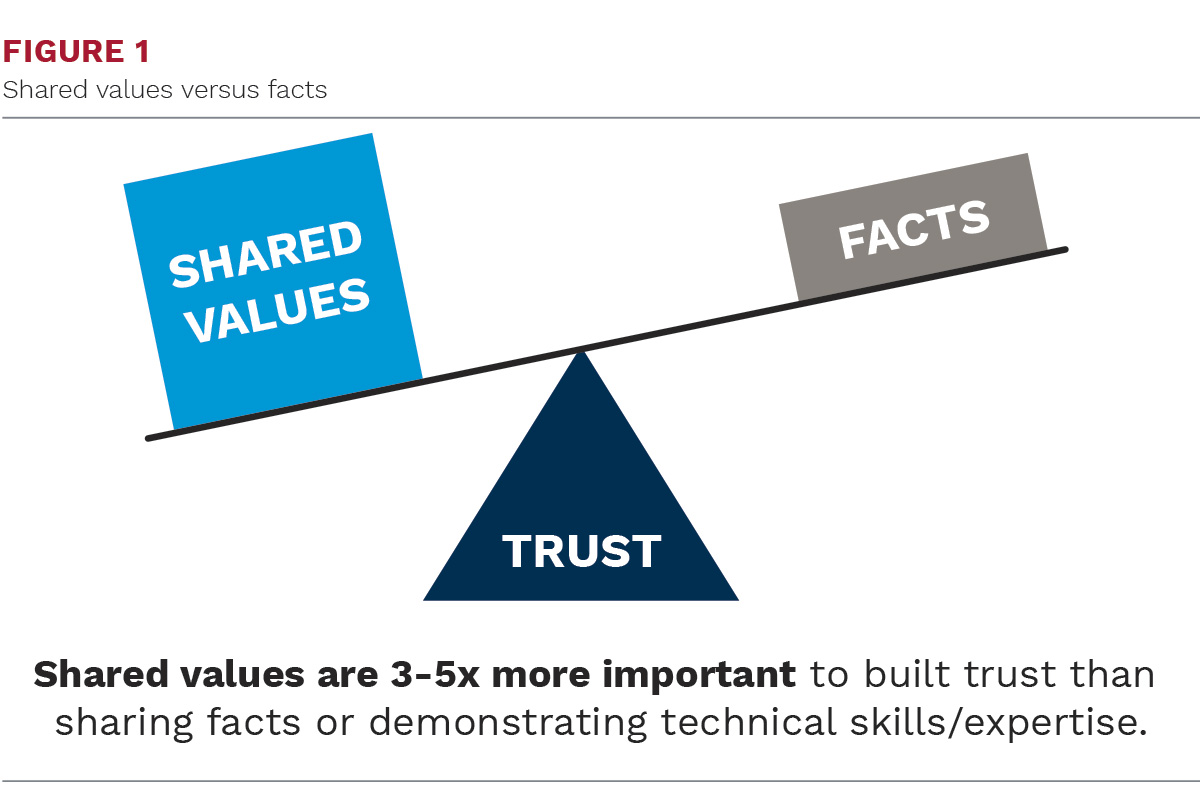
“Shared values are three to five times more important to build trust,” she said. Instead of “research shows” connect first with “It sounds like you care about animals, and so do I.” After confidence in shared values is established, individuals are more willing to consider technical information – or competence – in their decision-making.
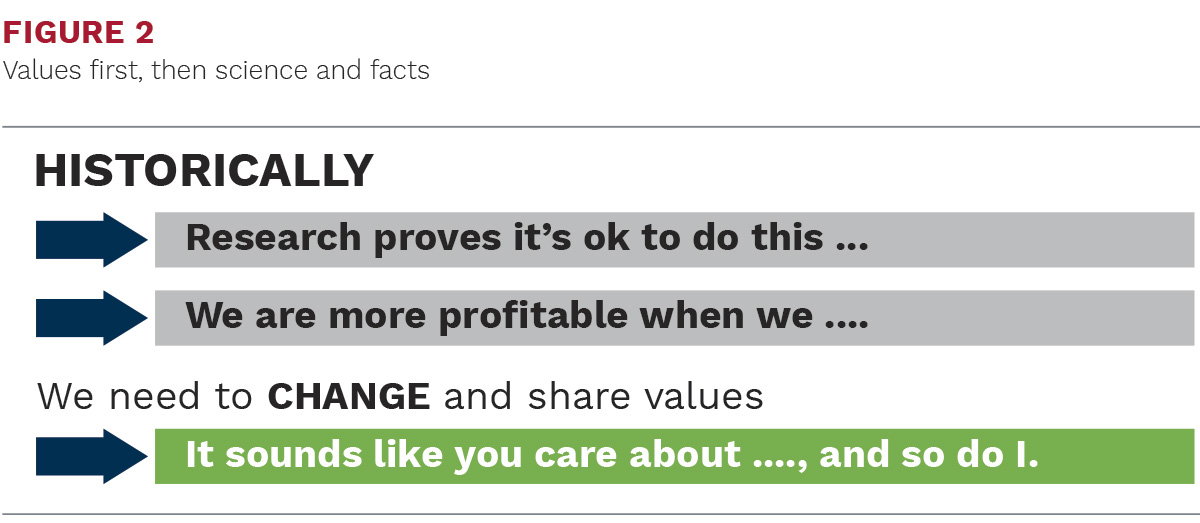
Meaningful dialogue happens with people who have differing perspectives about food and farming when we work to understand their viewpoint, and then introduce science, for thoughtful, informed decision-making. Three simple steps to help find common ground and begin to earn trust include:
1. Listen: Set aside judgment and truly listen
2. Ask: Acknowledge their viewpoint and ask questions to better understand their “why”
3. Share: Find common ground to express shared values, along with your experience and facts
Whether in person, online, with family or perfect strangers, skepticism persists, and perception is the reality through which customers make decisions. Use concern and skepticism as the fuel for conversation and discovery.
“Transparency is no longer optional,” te Plate-Church said. Farmers and all in the agriculture community must develop new models for authentic engagement. Growing skepticism about food safety, the size and scale of modern agriculture, and use of technology fuel online communities and non-governmental organizations to raise issues and make their voices heard with increasing volume and frequency. The question for agriculture and food is no longer “Will you be transparent?” but rather, “How will you protect your social license in an age of radical transparency?”
EVERYTHING YOU MUST KNOW ABOUT SLEEP BUT ARE TOO TIRED TO ASK
Having seven hours of sleep is essential for adult learning, memory, and creative problem solving, said Dr. James Maas (“Sleep for Success!”) in his keynote “Everything you must know about sleep but are too tired to ask.” A sleeping brain transfers knowledge and skills to long-term memory and is the single-most effective way to improve overall health and performance. “The average person takes 20 minutes to fall asleep. If you fall asleep quickly, you are seriously sleep-deprived,” Dr. Maas said. Good sleep hygiene includes a regular schedule, a dark, cool room, restricting caffeine after 2:00 PM and limiting electronics before sleep. A white noise machine, like The Dohm, can help. “If you’re stressed out, have a little worry time. Write them down,” he said. “If you’re having insomnia, try not to fall asleep; it will find you. Imagine you’re lying on a beach being peaceful and calm.” Stay up late a few nights with no naps to consolidate your sleep. If you wake in the middle of the night, try reducing liquids before going to bed, and keep lights low if you get up. Alertness dips between one and three PM in the afternoon. If possible, Dr. Maas said, take a 20-minute power nap, or a 90-minute nap for a full REM cycle. Exposure to UV light can jumpstart mornings. Sit a few feet away from a light for 15 minutes. For shift work, Dr. Maas recommends working the same schedule for three weeks, and then having three days to adjust sleep schedule between schedule changes. Use a daylight spectrum light, reduce caffeine, sleep in a dark room, and have daylight spectrum-blocking glasses for the drive home, he said.
SAFETY PROGRAMS: THE IMPORTANCE OF PRIORITIZING CONTINUOUS IMPROVEMENT
Safety was a strong theme of the conference. “Safety doesn’t interrupt the work. It’s how we do the work,” said Lisa Ford, Cayuga Marketing Members Program Manager, during her presentation on “Creating a culture of safety in your workplace.” Build safety into SOP’s. “Do the right thing, model, and take action,” she said. This was followed later in the conference by a sobering first-hand account of a farm accident during the “Safety panel, safety programs: The importance of prioritizing continuous improvement,” led by Tonya Van Slyke, NEDPA Executive Director. Have a written emergency plan in place and reach out for support from industry organizations if an incident does occur. Review what occurred to prevent future accidents and offer mental health support to those impacted. “We need to normalize having conversations about near misses and the emotional burden of working on a dairy,” panelist Dr. Noa Román-Muñiz said.
BREAKOUT SESSIONS
Attendees engaged with breakout sessions in dairy, human resource management, and crops tracks. A number of the sessions featured ways that technology, good data, clear communication, and streamlined processes improve decision-making, efficiency, and accountability in your herd and with your farm team.
- Dairy presentations included: Using employee-level reporting to get better outcomes for your team, Calf barn ventilation, Epidemiology of bovine colostrum yield and Brix percent in New York herds, and Improving dairy herd health monitoring and management using automated monitoring technologies.
- “There are no jobs, there are professions. Establish your culture,” said Collin McCarthy, Cargill, who led a presentation on Structure: Reducing chaos and the broken stove meetings. Clear communication of responsibilities and the chain of command on farms builds order. Other human resource management sessions included: Conflict management for those who do not like conflict management, Improving communication among English- and Spanish-speaking team members, Engaging today’s employees using technology, Lean 5S: Making the physical workplace work!, and Creating a culture of safety in your workplace.
- Crops sessions included: What is NetZero and what does it mean to me as a middle manager?, Planting green: Advantages of delayed cover crop termination in western New York, Corn planter workshop, and concluded with a CAFO manure applicator training.
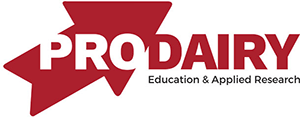 |
This article appeared in PRO-DAIRY's The Manager in July 2023. To learn more about Cornell CALS PRO-DAIRY, visit PRO-DAIRY. |
